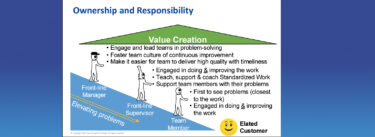Whenever I visit a workplace, whether it’s a coffee shop or a cube farm, a meeting room or a shop floor, I tick through a series of observations and questions. Perhaps you have your own such routine.
First, I scan faces. I look for joy, focus, frustration, despair, indifference, or even anger. Simultaneously, I watch the work (What’s being created? How?) and its effect on those who are doing it (That doesn’t look safe …). Next, I turn to the inorganic: machines, parts, information, even ideas. (Are they running? Are they flowing?) And finally, I ask questions: “Who is the work for? What do those customers expect? How are things going? How do you know? And what’s being done about it?”
To sum-up: Work/er first, including the environment. And then, a bit deeper thinking about purpose and management.
I’m wondering, as a leader and a coach, how can I help others develop similar routines, propagating, for example, the principle of “work/er first” or “work/er-back.” Reflecting on that has taken me all the way back to my “lean origin story.”
I’m Batman. Or Mario. Or a Barista with a Cape, by Which I Mean, a Green Apron
The origin story is a literary device often used with superheroes. (Unnecessary disclaimer: I am not a superhero. My kids used to think I was, but no longer: both of them now can beat me in Mario Kart.) The origin story identifies the source of a character’s motivation and helps to explain their intentions and behaviors. The senseless murder of Bruce Wayne’s parents explains why he created an alter ego – Batman – to rid the City of Gotham of evildoers like the Joker.
Look to the past to understand the present…
When I first encountered lean management, I was predisposed to a better (scratch that) any other way of running my coffee shop. I had been a store manager for a few years. Year-over-year sales growth had been in the double digits. But then, seemingly over night, the lines of customers disappeared. A formal recession would soon be declared. Having lost the cover of strong sales, my inexperience as a manager was exposed for all to see – my customers, my bosses, and my team members.
Ideas for how to respond to the crisis came from every direction. Recognizing the game, I made up some myself, pulling them out of…thin air. There was no shortage of “best practices.” None of ‘em worked. Sales kept going down, and I had no clue what to do about it. The business need was clear and personal.
Moreover, I was worn out. My daily work was hard and frustrating. It was filled with unevenness (mura), overburden (muri), and of course, good old-fashioned muda, or waste. (Not that I was aware of the 3Ms at the time.) On some days, the back room was overflowing with supplies. On others, team members had to go to nearby stores to “borrow” products we’d run out of. In some moments, things flowed. We got customers in and out quickly. In others, we were buried under piles of orders – cups and bags to fill. Far too often, things just didn’t work – as expected, or at all.
I had a method! We had a method! And in fact, business did get better. As did the overall work experience.
I was desperate for a tried-and-true method for running my business and solving the problems I had.
But First, My A, B, Cs, 3 Ms, 5 Ss, and 5 Whys
Thankfully, a few folks from headquarters showed up. Flanked by a couple of consultants, they described the promise of lean. No arm twisting was needed. I was all in. Like I said, I was predisposed.
But they weren’t counting on that. In fact, before enlisting me, they’d experimented on their own, validating that ideas from factories were indeed relevant to coffee shops, and how exactly. To this day, I appreciate their due diligence. They prepared themselves for when I might say, “But we don’t make cars!”
Anyway, they took my team and me through a typical sequence of lean training – 5S, standardized work, flow and pull systems, visual management, etc.–and assigned homework to try out the various concepts and tools. We went buck wild! 5Sing this, standardizing that, and visualizing all of it. We were engaged, trying out new ideas. Not only was it fun, we were learning too.
“What problem are you trying to solve?” (BOOM! KAPOW! WHAM-O!)
I encourage you to recognize the significance of your influence on others, especially those who are new to lean.
But then, and I’ll never forget this, an executive came by to check out what we were doing. He was the head of global strategy who had introduced lean to the company. When he arrived, I showed him around the shop, proudly pointing out things like clever little signals we’d created for replenishing supplies. But then, like drenching me with a bucket of ice-cold water, he asked me a question. “Tell me, what problem are you trying to solve?” The truthful answer was, “Dunno,” though I made something up, stuttering my way through it, I’m sure. Like a good coach, he listened patiently.
We ended up adopting that question, asking it over and over again. It gave our improvement activities purpose. They became more meaningful. For example, instead of 5Sing an area simply because it was messy, we used 5S while standardizing work in order to ensure customers consistently got attentive service and tasty cups of coffee.
I had a method! We had a method! And in fact, business did get better. As did the overall work experience.
But What About the Expanded Universe?
Look, I’m super grateful to be a lean practitioner. I can call upon lean thinking for any challenge. I can build enabling systems and processes around work of virtually any kind. It’s helped me manage and solve problems for over a decade, going all the way back to when I was a fledgling store manager who was completely overwhelmed.
I’m also grateful that lean showed up when it did. Essentially, as a frontline supervisor in operations, I just wanted to do right by my team, to provide great customer experiences, and to impress my bosses by delivering business results the “right way.” That lean helped me with those things is reflected in my approach, even to this day. Just look at the routine I described earlier. (Interestingly, I’ve seen a wide variety of such routines. It makes me wonder: how much of that variation is due to the different contexts and timing of folks ’lean origin stories?)
The thing is, as business leaders, managers, coaches, and even peers, you and I are regularly contributing to the lean origin stories of other people, even if we’re unaware of it. (I shudder to think about how many lean origin stories I’ve influenced negatively.) So, I encourage you to reflect on your own, looking for “root causes” of your current behaviors. And more importantly, I encourage you to recognize the significance of your influence on others, especially those who are new to lean. Will their lean origin stories place them on a path to create good jobs and good work? Or will they end up only concerned with the bottom line, seeking profit at all costs? And remember, in their eyes, you may indeed be a superhero.
Virtual Lean Learning Experience (VLX)
A continuing education service offering the latest in lean leadership and management.






